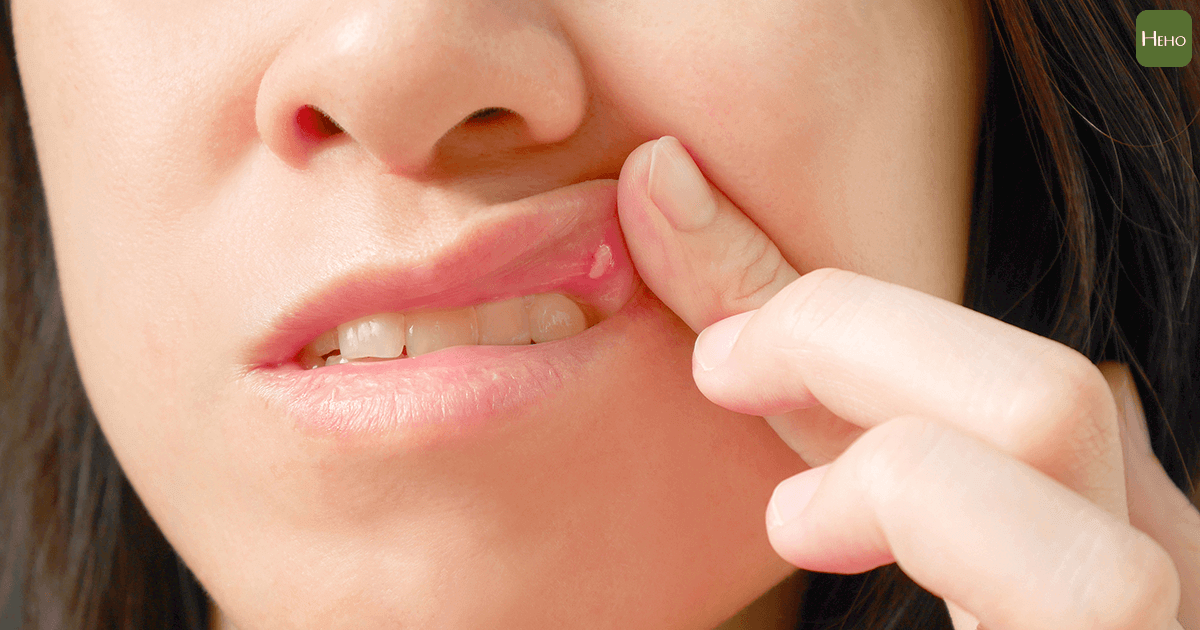Among patients with oral cancer, approximately 5-14%, and even up to 40%, also have esophageal cancer. The probability of first-time patients under the age of 50 developing two types of cancer simultaneously is even higher. Betel nut, tobacco, and excessive alcohol consumption are common risk factors for these two cancers. In addition to quitting these habits, regular check-ups are necessary to avoid becoming a victim of double cancer.
According to the 2021 Cancer Registry Report by the Ministry of Health and Welfare, oral cancer and esophageal cancer rank 3rd (7,387 cases) and 6th (2,614 cases) respectively in age-standardized incidence rates of male cancers. The median age of onset for oral cancer is 58 years, and for esophageal cancer, it is 60 years. Symptoms of oral cancer include persistent ulcers in the mouth that do not heal. (Image provided by Heho Health)
Symptoms of oral cancer include persistent ulcers in the mouth that do not heal. (Image provided by Heho Health)
Because the mouth, lungs, and esophagus are part of the upper respiratory and digestive tracts, they share similar risk factors for developing cancer. Approximately 5-12% of esophageal cancer patients may also develop head and neck cancer or lung cancer. Conversely, around 5-14% of oral cancer patients (including oropharyngeal and hypopharyngeal cancer) may also develop head and neck cancer or lung cancer, with up to 40% also having esophageal cancer. The probability is higher for first-time patients under the age of 50 to develop two types of cancer simultaneously.
Eliminate Common Risk Factors, Don’t Become a High-Risk Group When mucosal cells in the esophagus accumulate severe mutations, they may develop into esophageal cancer. The exact causes of esophageal cancer remain unclear, but in addition to age (predominantly middle-aged and elderly) and gender (more common in males than females), various chronic irritations to the esophagus in daily life can contribute to the development of esophageal cancer.
Oral cancer is a general term for malignant tumors occurring in the oral cavity, most of which are squamous cell carcinomas. They can appear in any part of the mouth, including the lips, tongue, gums, floor of the mouth, hard palate, buccal mucosa, and the retromolar trigone area. The development of esophageal cancer and oral cancer may be related to some common risk factors, including betel nut, tobacco, excessive alcohol consumption, long-term malnutrition (lack of β-carotene, vitamins A, B, C, E, selenium, and iron), and human papillomavirus (HPV) infection.
Particularly, betel nut (containing alkaloids, polyphenolic compounds, and ingredients such as safrole in areca flower), tobacco (containing nicotine, aromatic amines, polycyclic aromatic hydrocarbons, and acetaldehyde), and alcohol (containing acetaldehyde) are common among users. Those who use these substances have a 10.5 times higher risk of developing upper respiratory and digestive tract cancers (including oral, pharyngeal, laryngeal, and esophageal cancers) than non-users.
Other risk factors for esophageal cancer include:
- Foods containing nitrosamines (e.g., pickled and smoked foods)
- Hot beverages (above 65°C)
- Obesity (sedentary lifestyle)
- Chronic gastroesophageal reflux, Barrett’s esophagus, corrosive esophagitis, achalasia
- Genetic factors (Tylosis, Plummer-Vinson syndrome)
Other risk factors for oral cancer include:
- Dental factors (improper dentures, gingivitis, poor oral hygiene)
- Genetic factors (Fanconi anemia, dyskeratosis congenital)
Monitor Symptoms Persisting for Several Weeks and Seek Medical Attention Promptly If cancer can be diagnosed early and treated early, the preservation of function, quality of life, and prognosis will be better. Therefore, if the following symptoms persist for several weeks, be vigilant and seek medical attention promptly. Nicotine in cigarettes is toxic. (Image provided by Heho Health)
Nicotine in cigarettes is toxic. (Image provided by Heho Health)
Symptoms of oral cancer include persistent ulcers in the mouth (at the same site for more than two weeks), leukoplakia, erythroplakia, unexplained lumps, unexplained bleeding, pain when chewing or swallowing, ear pain, localized tenderness, abnormal sensations (numbness), limited tongue movement, difficulty opening the mouth, difficulty swallowing, speech difficulties, bad breath (rotten smell), tooth loss, weight loss, and neck lumps.
Early symptoms of esophageal cancer are usually not obvious, but as the disease progresses, symptoms may include a sensation of a foreign body when swallowing, progressive difficulty swallowing, pain when swallowing, vomiting after eating, food regurgitation, heartburn, weight loss, chest pain, vomiting blood, black stools, coughing while swallowing, chronic cough, recurrent pneumonia, hoarseness, and neck lumps.
These two cancers often occur in the same person! Those with habits of smoking, drinking alcohol, and chewing betel nuts have a 10.5 times higher incidence rate compared to non-users.







